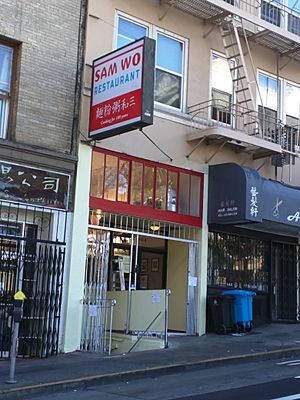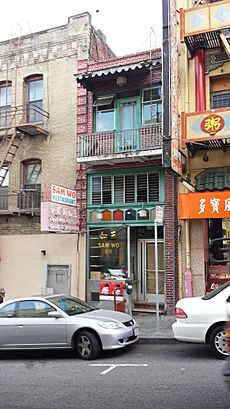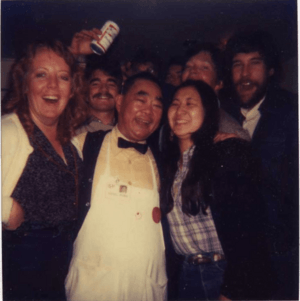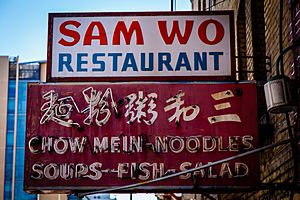Sam Wo facts for kids
Quick facts for kids Sam Wo Restaurant |
|
|---|---|
 |
|

New location of Sam Wo Restaurant (opened 2015).
|
|
| Lua error in Module:Location_map at line 420: attempt to index field 'wikibase' (a nil value). | |
| Restaurant information | |
| Current owner(s) | David Ho |
| Street address | 713 Clay Street |
| City | San Francisco |
| County | San Francisco |
| State | California |
| Postal/ZIP code | 94108 |
| Coordinates | 37°47′42″N 122°24′24″W / 37.795034°N 122.406729°W |
Sam Wo (which means "Three Harmonies Porridge and Noodles" in Chinese) is a famous Chinese restaurant in San Francisco, California. Its first home on Washington Street was a very old and important part of the local Chinatown area. It had been there since 1907.
Sam Wo became well-known in the 1980s because of a waiter named Edsel Ford Fung. He was locally known as the "world's rudest waiter." The restaurant had to close in 2012 due to some building issues. But it happily reopened in 2015 on a nearby street called Clay Street.
Contents
The Story of Sam Wo Restaurant
There isn't much written history about how Sam Wo Restaurant first started in 1912. But many people believe it was the oldest restaurant in Chinatown. It was likely built around or after the big 1906 San Francisco earthquake. Some records even say Sam Wo was at its 813 Washington Street spot from 1907.
Sam Wo was popular with San Francisco locals for its simple, tasty, late-night food. It was also known for its unique service style. The restaurant used to stay open until 3 AM, making it a favorite spot. In the 1950s, Sam Wo was a hangout for poets like Michael McClure, Allen Ginsberg, and Charles Bukowski. These writers were part of a group called the Beat Generation.
Meet Edsel Ford Fung: The Famous Waiter
The Sam Wo Restaurant was very famous because of its waiter, Edsel Ford Fung. People often called him the "world's rudest waiter." He was known for his strict rules and unique way of serving customers. For example, he might refuse to serve people whose look he didn't like. He would also tease customers who complained about their orders.
Edsel passed away in 1984, but he left a lasting memory for many San Franciscans. Some of his funny signs stayed up at the Washington Street restaurant. These signs included rules like "No Jive, No Coffee, Milk, Soft Drinks, Fortune Cookies." This was quite unusual for a Chinese restaurant!
The Original Restaurant's Unique Design
The first Sam Wo location at 813 Washington Street had a very special layout. Customers would walk through the kitchen right from the street. Then, they would go up narrow stairs to dining rooms on the second and third floors. A dumbwaiter (a small elevator for food) was used to send meals upstairs. After eating, customers would pay the cashier at the front of the restaurant.
Why Sam Wo Closed and Reopened
In April 2012, the San Francisco Health Department ordered the restaurant to close. This was due to some issues with the building's condition and safety rules. The restaurant closed its doors on April 20. On its last day, long lines of people waited outside to get one last meal.
The owner, David Ho, promised to fix the problems and reopen. A health department representative hoped for the best. They knew how much people loved the restaurant. The main problem was that the building was very old and needed expensive updates.
At a meeting on April 24, David Ho heard about all the changes needed. These included a new refrigerator and separate sinks for washing hands, dishes, and preparing food. The building also needed fire escape repairs. Many supporters of the restaurant came to the meeting. David's daughter, Julie Ho, thought they could reopen in a month or two.
The cost to fix the old restaurant was estimated at $100,000 in September 2012. A group called the Save Sam Wo Coalition started a fundraiser. One year later, in September 2013, the estimated cost had jumped to $300,000. This extra cost, along with problems with the lease, meant Sam Wo couldn't reopen in its original spot.
When the owner and supporters had almost enough money, the building's owner leased the space to a different business. David Ho then made sure to trademark the Sam Wo name. This way, no one else could open a Sam Wo restaurant using that name.
A long time ago, [Sam Wo's] was built from something bad [the 1906 earthquake], and something nice blossomed from it. The restaurant blooming again is something to look forward to.
—David Ho, owner of Sam Wo, San Francisco Chronicle article, 2 October 2015
In 2014, the restaurant's management announced on Facebook that Sam Wo would return! They took over the space of a former bakery called Anna Bakery. They even planned to offer some of Anna Bakery's popular baked goods. The restaurant finally reopened at its new location on October 21, 2015. The new spot at 713-715 Clay Street has a basement kitchen and a mezzanine level. It even has a dumbwaiter to bring back some of the old restaurant's charm.
In December 2015, a food critic named Michael Bauer reviewed the new Sam Wo. He said it felt like it had been there for decades. But he also noted it was a cleaner, updated version. He felt it kept its special character and would feel even more like the original over time.
In April 2016, the iconic neon sign was moved to the new Clay Street location. This sign was first put up in the 1930s. In May 2016, the new restaurant extended its hours to 3 AM on Friday and Saturday nights. This brought back the late-night tradition of the original Sam Wo.
Sam Wo in Pop Culture
Sam Wo has been mentioned in many books, articles, and TV shows over the years.
- Author Armistead Maupin wrote about his experiences there.
- Journalist Herb Caen also shared stories about the eatery.
- Late-night talk show host Conan O'Brien even featured Sam Wo in a segment. It included a special appearance by Martha Stewart.
Shirley Fong-Torres wrote in her 2008 book The Woman Who Ate Chinatown that customers "came to see and be verbally abused by Edsel." This shows how famous Edsel Fung was.
The well-known California poet Gary Snyder suggests "congee at Sam Wo" as one of the "Things to Do Around San Francisco." This is mentioned in his book Mountains and Rivers Without End.
It's important to know that Sam Wo in San Francisco is not connected to a restaurant with the same name that used to be in New York City's Chinatown. The New York restaurant was famous for being mentioned in the 1979 Woody Allen film Manhattan.
|
 | Valerie Thomas |
 | Frederick McKinley Jones |
 | George Edward Alcorn Jr. |
 | Thomas Mensah |




